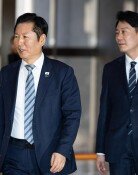Transformation is the Key for Corporate Success
Transformation is the Key for Corporate Success
Posted October. 11, 2004 23:06,
A company has to maintain a healthy financial structure, work hard to transform itself to meet market needs, and develop a strong sense of trust between labor and management. Otherwise, the company will be short-lived, said Kim Seong-pyo, a senior researcher at the Samsung Economic Research Institute.
Kumkang, which has produced mens shoes since 1954 when the company was established, began selling a rubber-soled shoe line, Landrover, in 1973. This was a first in the history of Koreas shoe market. Furthermore, starting in 1999, the company started to tailor shoes to customers who worry if their feet are too small or too big. Kumkang has developed itself continuously over the years.
Companies that dominate the market for a long time such as Kumkang embrace new ideas with open arms. They steer themselves towards maximum benefits with little risk.
The Key to Cheil Industries continuing success is also the same. The company has transformed itself under the motto, We change ourselves every 10 years, moving into various fields such as textiles, clothes, chemicals, and electronic materials.
The leadership of a CEO also plays a crucial role in a companys success. Chang Young-sil, chairperson of Aekyung, a household goods producer, which was established in 1954, set up a major technology research center in 2001 when the company was in extremely poor financial condition. At that time, Chang said, What helps us survive in a competitive market 50 years later is this technology research center, to mitigate internal resistance to the project.
Luck goes to those who are ready. Hankook Chinaware, which was established in 1943, is known as a company that only accepts cash, not bills.
Ironically, for 30 years after its establishment, debt was the major financial source of burden for this company, even after it spent 40 percent of its income from sale paying off interest.
However, after ending its debt-ridden condition, the company developed a new management system on the back of a healthy financial structure, which consequently made the company into one of the major chinaware producers with branches in New York and Los Angeles in the U.S.
Human resources are the last resort to companies. The Hite, formerly Choseon Beer, which was established in 1933, saw its market share fall from 30 percent to 20 percent in May 1992, one year before its 60th anniversary, due to the increasing market share of its rival, Oriental Brewer.
However, instead of restructuring, the company trusted its workers. And it paid off. A research task force that consisted of workers invented a brand new beer, and it hit the market successfully.
Keuk-In Bae bae2150@donga.com







